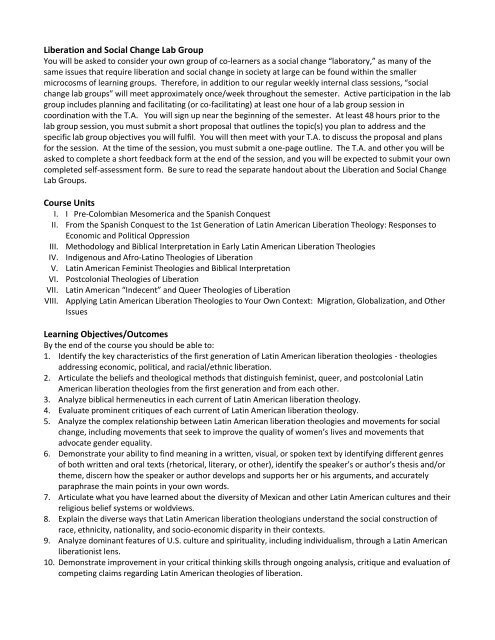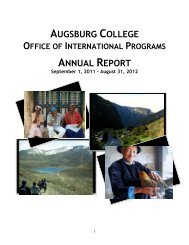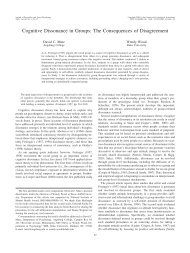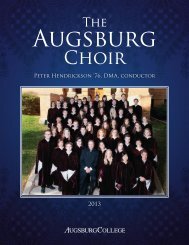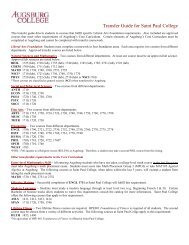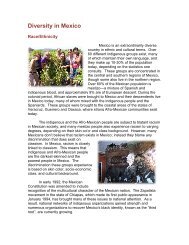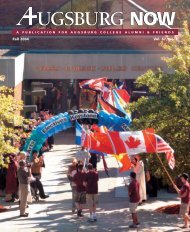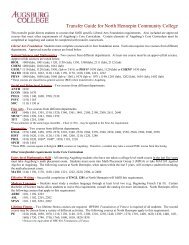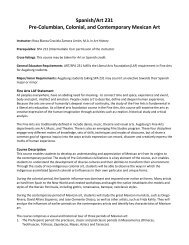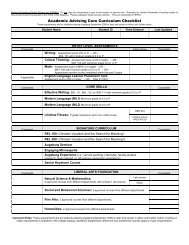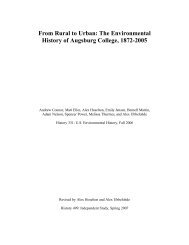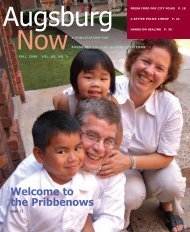Liberationist, Feminist, Queer and Postcolonial ... - Augsburg College
Liberationist, Feminist, Queer and Postcolonial ... - Augsburg College
Liberationist, Feminist, Queer and Postcolonial ... - Augsburg College
Create successful ePaper yourself
Turn your PDF publications into a flip-book with our unique Google optimized e-Paper software.
Liberation <strong>and</strong> Social Change Lab Group<br />
You will be asked to consider your own group of co-learners as a social change “laboratory,” as many of the<br />
same issues that require liberation <strong>and</strong> social change in society at large can be found within the smaller<br />
microcosms of learning groups. Therefore, in addition to our regular weekly internal class sessions, “social<br />
change lab groups” will meet approximately once/week throughout the semester. Active participation in the lab<br />
group includes planning <strong>and</strong> facilitating (or co-facilitating) at least one hour of a lab group session in<br />
coordination with the T.A. You will sign up near the beginning of the semester. At least 48 hours prior to the<br />
lab group session, you must submit a short proposal that outlines the topic(s) you plan to address <strong>and</strong> the<br />
specific lab group objectives you will fulfil. You will then meet with your T.A. to discuss the proposal <strong>and</strong> plans<br />
for the session. At the time of the session, you must submit a one-page outline. The T.A. <strong>and</strong> other you will be<br />
asked to complete a short feedback form at the end of the session, <strong>and</strong> you will be expected to submit your own<br />
completed self-assessment form. Be sure to read the separate h<strong>and</strong>out about the Liberation <strong>and</strong> Social Change<br />
Lab Groups.<br />
Course Units<br />
I. I Pre-Colombian Mesomerica <strong>and</strong> the Spanish Conquest<br />
II. From the Spanish Conquest to the 1st Generation of Latin American Liberation Theology: Responses to<br />
Economic <strong>and</strong> Political Oppression<br />
III. Methodology <strong>and</strong> Biblical Interpretation in Early Latin American Liberation Theologies<br />
IV. Indigenous <strong>and</strong> Afro-Latino Theologies of Liberation<br />
V. Latin American <strong>Feminist</strong> Theologies <strong>and</strong> Biblical Interpretation<br />
VI. <strong>Postcolonial</strong> Theologies of Liberation<br />
VII. Latin American “Indecent” <strong>and</strong> <strong>Queer</strong> Theologies of Liberation<br />
VIII. Applying Latin American Liberation Theologies to Your Own Context: Migration, Globalization, <strong>and</strong> Other<br />
Issues<br />
Learning Objectives/Outcomes<br />
By the end of the course you should be able to:<br />
1. Identify the key characteristics of the first generation of Latin American liberation theologies - theologies<br />
addressing economic, political, <strong>and</strong> racial/ethnic liberation.<br />
2. Articulate the beliefs <strong>and</strong> theological methods that distinguish feminist, queer, <strong>and</strong> postcolonial Latin<br />
American liberation theologies from the first generation <strong>and</strong> from each other.<br />
3. Analyze biblical hermeneutics in each current of Latin American liberation theology.<br />
4. Evaluate prominent critiques of each current of Latin American liberation theology.<br />
5. Analyze the complex relationship between Latin American liberation theologies <strong>and</strong> movements for social<br />
change, including movements that seek to improve the quality of women’s lives <strong>and</strong> movements that<br />
advocate gender equality.<br />
6. Demonstrate your ability to find meaning in a written, visual, or spoken text by identifying different genres<br />
of both written <strong>and</strong> oral texts (rhetorical, literary, or other), identify the speaker’s or author’s thesis <strong>and</strong>/or<br />
theme, discern how the speaker or author develops <strong>and</strong> supports her or his arguments, <strong>and</strong> accurately<br />
paraphrase the main points in your own words.<br />
7. Articulate what you have learned about the diversity of Mexican <strong>and</strong> other Latin American cultures <strong>and</strong> their<br />
religious belief systems or woldviews.<br />
8. Explain the diverse ways that Latin American liberation theologians underst<strong>and</strong> the social construction of<br />
race, ethnicity, nationality, <strong>and</strong> socio-economic disparity in their contexts.<br />
9. Analyze dominant features of U.S. culture <strong>and</strong> spirituality, including individualism, through a Latin American<br />
liberationist lens.<br />
10. Demonstrate improvement in your critical thinking skills through ongoing analysis, critique <strong>and</strong> evaluation of<br />
competing claims regarding Latin American theologies of liberation.


